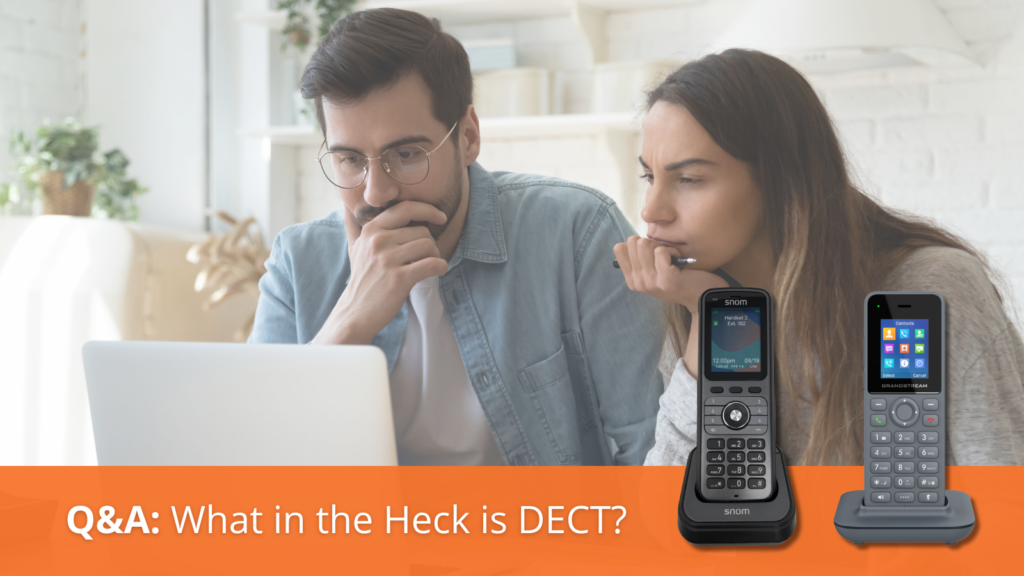Q & A: What in the Heck is DECT?

If you’ve ever wondered what DECT is and why you keep hearing about it in conversations related to wireless phones and VoIP communication devices, you’re in the right place. DECT might sound like tech jargon, but it’s a vital technology that powers many of the cordless devices you use today. Let’s break it down in this Q&A format to make it easy to understand!
What Does DECT Stand For?
DECT stands for Digital Enhanced Cordless Telecommunications. In simple terms, it’s a wireless communication standard primarily used in cordless phones and other wireless devices. It operates at a frequency that avoids interference from things like Wi-Fi or Bluetooth, making it reliable for voice communication.
How Does DECT Work?
DECT functions similarly to Wi-Fi or Bluetooth but is designed specifically for voice communication. It works by establishing a wireless connection between the base station and the handset, allowing you to move around while maintaining a strong, clear connection. DECT typically operates at the 1.9 GHz frequency, which helps to avoid interference from other common wireless devices.
Where is DECT Commonly Used?
DECT is most commonly found in cordless phones for home and business use. It’s also used in headsets, conference phones, and even some intercom systems. Businesses that rely on long-range wireless communication or have large office spaces often prefer DECT because it provides better range and clarity than other wireless standards.
What Are the Key Benefits of DECT?
Range: DECT offers greater range than Bluetooth, allowing you to move farther from the base station without losing connection. This makes it ideal for larger offices or homes.
Clarity: Because it operates on a dedicated frequency, DECT provides clearer voice quality with less interference from other wireless devices.
Security: DECT encryption makes it harder for unauthorized users to tap into conversations, which is especially important in business settings.
Battery Life: Devices using DECT tend to have better battery life, as the technology is designed to be energy efficient.
How Does DECT Compare to Wi-Fi or Bluetooth?
While Wi-Fi and Bluetooth are designed for a variety of purposes, DECT is optimized for voice communication. Wi-Fi is great for data-heavy tasks like browsing the internet or streaming, and Bluetooth is ideal for short-range connections like wireless speakers or headphones. DECT, on the other hand, excels in delivering clear, long-range audio and is less likely to suffer from interference.
Is DECT Only for Phones?
Not at all! While DECT is most known for cordless phones, it’s also used in wireless headsets, door entry systems, and more. Anywhere reliable wireless audio communication is needed, DECT technology can play a role.
Why Should I Care About DECT?
If you’re looking for a cordless solution for your home or office, DECT is worth considering for its superior range, sound quality, and reliability. Businesses, in particular, benefit from DECT technology in environments where mobility and clear communication are key. For consumers, a DECT-enabled phone or headset means better voice quality and fewer dropped calls.
Here Are Just a Few Popular DECT Products:
NEW! Snom M56 Ruggedized DECT Handset: A durable, high-performance communication device built for challenging environments. Its rugged design ensures protection against drops, dust, and water, making it ideal for industries such as construction and manufacturing.
Yealink’s W76P DECT Phone System: Ideal for businesses that require a flexible communication device that has a long DECT range and robust performance. Up to 10 Yealink W56H handsets can be paired to this system providing for mobility and flexibility like no other, all while remaining affordable.
Grandstream’s DP725 DECT Cordless IP Phone: Enables users to mobilize their VoIP network across various environments, including businesses, warehouses, retail stores, and homes. Supported by Grandstream’s VoIP base stations, it combines mobility with high-performance telephony, which offers a range of up to 400 meters outdoors and 50 meters indoors, with 50 hours of talk time and 500 hours of standby time.
Yealink’s WH64 DECT Hybrid Wireless Mono UC Headset: A premium headset that offers DECT wireless technology, ensuring a stable and clear connection with a range of up to 160 meters. It features advanced noise-canceling technology to minimize background noise, making it ideal for busy work environments.
Jabra’s Engage 55 MS Convertible USB-C Wireless DECT Headset: Offers superior wireless audio performance with a range of up to 490 feet, ideal for those requiring mobility and clear communication. Its lightweight, convertible design provides all-day comfort, and its DECT technology ensures secure, interference-free calls.
DECT might not be the flashiest term in tech, but it plays a significant role in wireless communication. Whether you’re making calls in a large office, walking around your home, or communicating with a wireless headset, DECT ensures you get a strong, clear, and reliable connection. Next time you hear someone mention DECT, you’ll know exactly what it is—and why it’s so important! If you have any questions or comments, leave them below, chat with one of our VoIP Experts at www.voipsupply.com, or call us at 1-800-398-8647.